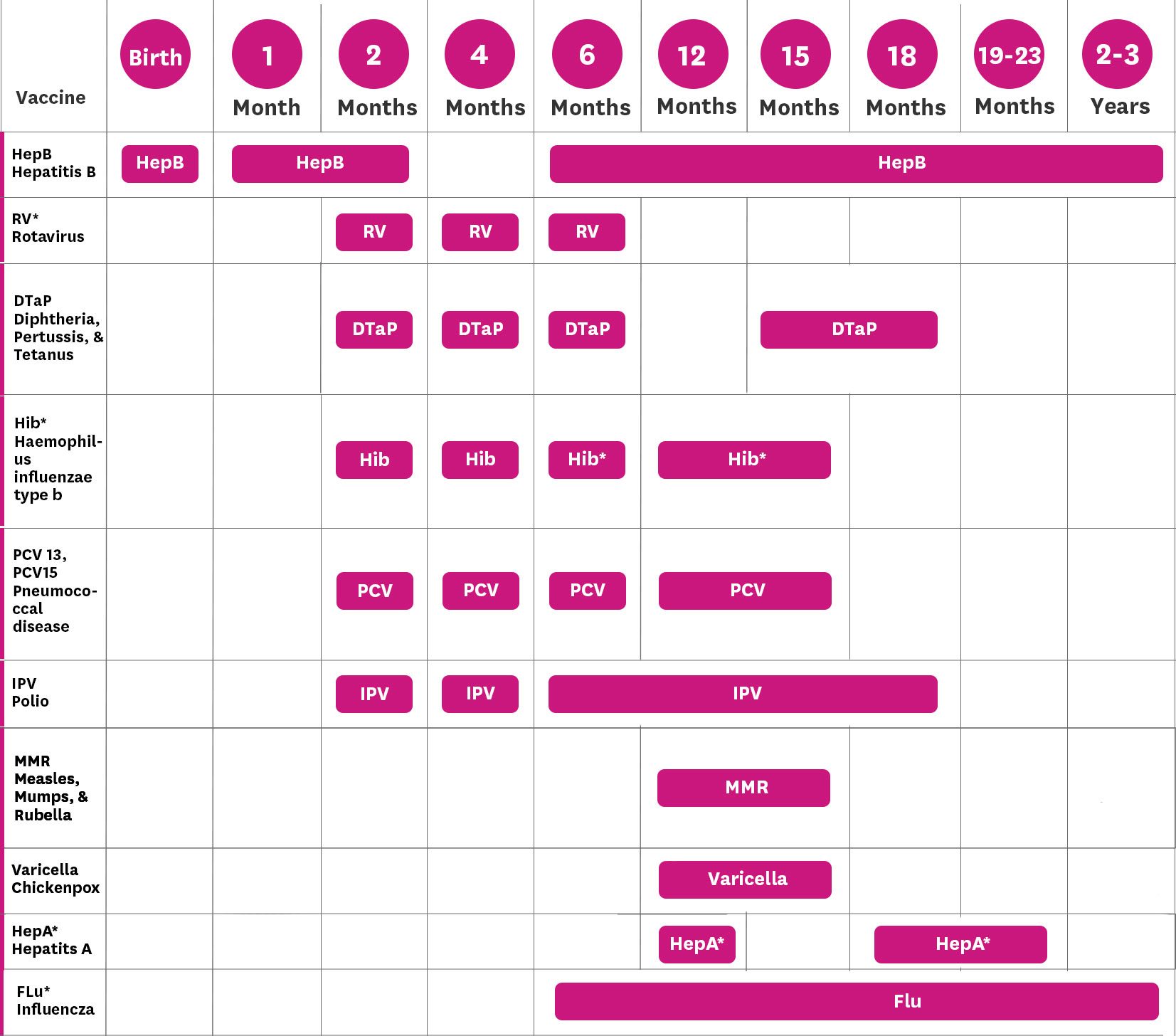Well Child Visit (0-3 Years Old)

Checkups allow a doctor to look at your child from head to toe. The first few check-ups are very important to make sure your baby is growing, feeding, and developing properly. If your baby hasn’t seen the doctor since discharge from the hospital, set up an appointment ASAP! A visit should be scheduled for all new members within 60 days, following visits should be scheduled based on the recommended guidelines (see the linked AAP Periodicity Table (PDF)).
- 3-5 days
- 1 month
- 2 months
- 4 months
- 6 months
- 9 months
- 12 months
- 15 months
- 18 months
- 24 months
- 30 months
Each exam should consist of:
- Full Physical Exam (length, height, weight, blood pressure and BMI %)
- Health History (initial and interval)
- Recommended Screens (catch up on missed or late recommended screens)
- Immunization/shots (catch up on missed of late immunizations/shots)
- Referrals as needed
Recommended Screenings
During each visit the following recommended screens should take place (see the linked AAP Periodicity Table (PDF).
| Recommended Screenings | Recommended Age(s) Child |
|---|---|
Behavioral Health Screen | Behavioral Assessment to be performed at each visit between 0 to 30 months. |
Hearing | All newborns should be screened during their first visit. Follow up or referrals should be conducted based on results. |
Dental | A dental screen should be completed by the 12-month exam and every 6 months after the first visit until 21 years. |
Lead Screen | A lead screen is required at 12 and 24 months. Children between 36-72 months must be tested if they have not been tested during the recommended time period. |
Autism Screen | An Autism Screen is required at 18 and 24 months. Catch up screens can be completed during your 30-month visit. |
Developmental Screen | A developmental screen is required at 9, 18 and 30 months. Developmental screens help to identify potential delays in growth and development. |
Anemia Screen | Should be performed at 12 months. Assessment for risk factors should continue at each visit. |
*For more information speak with your provider.
Immunizations / Shots
Babies and young children have not had time to develop a strong immune system, making them more vulnerable to infections. Immunizations can help prevent the spread of disease and protect infants and toddlers against dangerous complications. Below are the recommended immunizations based on age.
| Vaccine | Recommended Age(s) of Child |
|---|---|
| Hepatitis B (HepB) |
|
Rotovirus (RV)1 |
|
| Diptheria, Tetanus & acellular Pertussis (DTaP) |
|
| Haemophilus influenzae type b (Hib)2 |
|
| Pneumococcal disease (PCV13, PCV15) |
|
| Polio (IPV) |
|
| Measles, Mumps, & Rubella (MMR) |
|
| Chickenpox (Varicella) |
|
| Hepatitis A (HepA)5 |
|
| Influenza (Flu) |
|
Footnotes
RV1
Hib2
Administering a third dose at age 6 months depends on the brand of Hib or rotavirus vaccine used for previous dose.
Flu4
Two doses given at least 4 weeks apart are recommended for children aged 6 months through 8 years of age who are getting an influenza (flu) vaccine for the first time and for some other children in this age group.
COVID-193
Number of doses recommended depends on your child’s age and type of COVID-19 vaccine used.
HepA5
Two doses of Hep A vaccine are needed for lasting protection. The two doses should be given between age 12 and 23 months. Both doses should be separated by at least 6 months. Children 2 years and older who have not received two doses of Hep A should complete the series.

Members Can Earn a $50 My Health Pays® Visa Reward for Completing Your Infant Well Child Visits
Eligible members can earn a $50 My Health Pays® Visa reward* for completing all six infant well child visits with assigned PCP at 2, 4, 6, 9, 12, and 15-month. Dollar rewards are loaded on your My Health Pays® Visa Reward card (up to $75 annually) as members complete healthy activities such as an annual wellness visit.
*Your My Health Pays reward dollars are added to your rewards card after we process the claim for each activity you complete. Your empty My Health Pays Visa® Prepaid Card will be mailed to you approximately 2 – 3 weeks after you become eligible with Carolina Complete Health.
Teething
Most first teeth erupt by 6 months of age. Your baby might be teething already. Some common signs for teething are:
- Drooling (can last for weeks before a tooth appears)
- Irritability
- Pulling on ears or rubbing cheeks.
If your baby does not have teeth yet, you still need to clean your baby’s mouth after every feeding. If your baby is getting some teeth now, its ok to use small amounts of toothpaste without fluoride. Fluoride should not be used on babies under 6-7 months old.

